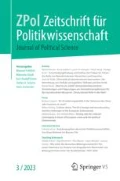Abstract
The introductory article first proposes a definition of the state of exception. A purely legal perspective proves to be insufficient. On the contrary, it is necessary, especially in analytical terms, to consider discursive and practical elements in order to adequately grasp the state of exception. In addition, it introduces the contributions of this volume.
Zusammenfassung
Der einleitende Beitrag schlägt zunächst eine Begriffsbestimmung des Ausnahmezustandes vor. Eine rein rechtswissenschaftliche Perspektive erweist sich dabei als nicht ausreichend. Vielmehr bedarf es, gerade auch in analytischer Hinsicht, einer Ergänzung um diskursive wie praktische Elemente, um den Ausnahmezustand angemessen erfassen zu können. Zudem werden die einzelnen Beiträge des Bandes vorgestellt.
Similar content being viewed by others
Notes
Without any question, such a situation would not only exist in the face of catastrophes or in political contexts, but also in economic ones: for instance, in connection with the question of the so-called Greek government debt crisis. However, the case studies in this volume do not cover the economic dimension of the SoE, except the study of Rafael Valim. More research contributions leading toward a deeper understanding of the economic dimension of SoE would be very welcome.
For the general distinction between legalists and extra-legalists, cf. Scheppele (2008).
In this article, we mainly comment on a talk by Petra Schulte (2018), held at the German Historical Institute, Paris, in June 2018. She argues that a significant practice of SoE exists in the late Middle Ages, too. Often neglected in political science studies, the notion of necessitas needs more consideration, as it constitutes an equivalent to modern crisis intervention.
The so-called pleins pouvoirs du président, as provided for in Article 16 of the Constitution of the Fifth French Republic, constitute a borderline case. Although the regulations are constitutionally codified, they might be interpreted that they, once applied, suspend the validity of the constitutional order. In this case, they are no longer legally integrated.
In addition, there is a strong analytical need to link such analyzes with the hegemonic narrative of neoliberalism. For example, in Demokratie unter Beschuss (Brown 2017), Wendy Brown stated that the “dictatorship of the executive” was the logical political consequence of a neoliberalism striving for freedom and authority alike. The market needs deregulation, the state the SoE.
Most of the papers have been presented at the 2017 State of Emergency conference that took place at the German Historical Institute in Paris. For more details on the conference, go to https://emergency.hypotheses.org/events/conference-2017.
References
Broughton, Thomas Robert Shannon. 1984. Magistrates of the Roman Republic. Chico: Scholars Press.
Brown, Wendy. 2017. Demokratie unter Beschuss: Donald Trump und der apokalyptische Populismus, in: Blätter für deutsche und internationale Politik. https://www.blaetter.de/archiv/jahrgaenge/2017/august/demokratie-unter-beschuss-donald-trump-und-der-apokalyptische-populism (Created 28 June 2017). Accessed 31 Aug. 2018.
Cicero, Marcus Tullius. 2004. De legibus. Berlin: De Gruyter.
Lemke, Matthias. 2017. Demokratie im Ausnahmezustand. Wie Regierungen ihre Macht ausweiten. Frankfurt a. M., New York: Campus.
Lemke, Matthias, and Louise Zbiranski. 2018. Ausnahmezustand – Ein Dialog über Epochen- und Disziplingrenzen hinweg, in: Veranstaltungen am DHI Paris. https://dhip.hypotheses.org/514 (Created 8 Aug 2018). Accessed 31 Aug. 2018.
Manin, Bernard. 2015. Le paradigme d l’exception. L’État face au nouveau terrorisme, in: La vie des idées. Dossier: Guerre, terrorisme, droit d’exception. http://www.laviedesidees.fr/Le-paradigme-de-l-exception.html (Created 15 December 2015). Accessed 31 Aug. 2018.
Rossiter, Clinton L. 1948. Constitutional dictatorship. Crisis and government in the modern democracies. Princeton: Princeton University Press.
Scheppele, Kim Lane. 2008. Legal and extralegal emergencies. In The oxford handbook of law and politics, ed. Keith E.William Whittington, R. Daniel Kelemen, and Gregory A. Caldeira, 165–184. Oxford: Oxford University Press.
Schulte, Petra. 2018. La normalité de l’exception dans la politique du XVe siècle (Podcast), in: Deutsches Historisches Institut Paris. https://www.dhi-paris.fr/fr/publications/podcast/2018-schulte.html (Created 14 June 2018). Accessed 31 Aug. 2018.
Author information
Authors and Affiliations
Corresponding author
Rights and permissions
About this article
Cite this article
Lemke, M. What does state of exception mean?. Z Politikwiss 28, 373–383 (2018). https://doi.org/10.1007/s41358-018-0141-4
Published:
Issue Date:
DOI: https://doi.org/10.1007/s41358-018-0141-4




